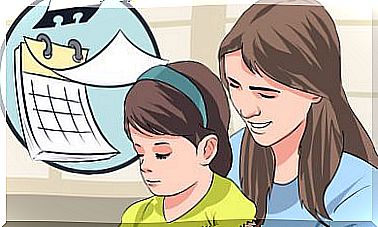3 Things Parents Should Not Discuss In Front Of Their Children

There are things we shouldn’t discuss in front of the children.
Our life changes with the arrival of a child. In general, it is more noticeable in our habits and daily routines, but these changes also affect the way we speak and communicate. Most children tend to imitate their parents by what they do and what they say. Therefore we need to watch our behavior closely and know what we should and shouldn’t discuss in front of the children .
In order to transfer behavior, it is not necessary to address the children directly. It is enough for the little ones to be present, because they understand a lot more than we think. They will learn from everything we do and that will determine their future behavior. Hence, we need to avoid certain behaviors and problems until they can better understand the context and situation.
Why shouldn’t we discuss certain topics in front of the children?
When they are young, children interpret the world from a very specific perspective. They understand and absorb a lot more than we think, but they literally do it.
That is, even if they understand a general concept, they do not recognize the nuances, phrases, or metaphors that we are using. For example, if we mention that the neighbor has crow’s feet, we shouldn’t be surprised if our child then pays attention to whether her legs are actually similar to those of the animal.
Nor can they understand irony, sarcasm and ambiguity. Or that in a moment of anger we can say something that we will regret later. All these nuances that children cannot understand go into their imagination.
As they understand the non-verbal language, i.e. the forms of expression in our body, better, they grasp the emotional situation. As a result, the details that they did not understand are replaced by the emotional mood.
“Without knowing it, we transmit a lot of information to the children. This can be a confusing emotional burden for the little ones. ”
This can cause several problems. We’re not just referring to the embarrassing moment when your child continues to share gossip. More worrisome are situations where children feel confused or ambivalent without really understanding the cause.

An example to illustrate this
Imagine the following situation: We argued with our parents and tell our partner about it. The child is there and does not understand this conflict with the grandparents, whom they love very much. How will it feel He believes that when someone does something wrong, one is angry. So are the grandparents bad? How should it treat you? What is going to happen, what can it do?
We can create this confusion in our children in very different situations. Couple relationships, friendships, schools or “adult worries” that we unconsciously bring up to the child who cannot deal with such complex emotions. We need to be attentive to what we are discussing and saying in front of the children without stopping communicating with the children.
Some topics we shouldn’t discuss in front of children
Here is a list of topics that we should avoid discussing in front of the children.
- Talking badly about other people. That includes gossip in general. Children, especially the youngest, are unable to understand these private comments or our role in them. As we showed above, they can feel confused, torn, and even guilty.
- “Worries of Adults.” Money, time, food … We shouldn’t let everything that worries us be passed on to our children. As they get older, we can explain these situations to them, but always in a way that they can understand.
- Discuss things in front of the children as if they weren’t there. Nicknames or comments about their physique or intellect, especially if they are negative, can create complexes.

We also need to take into account the tone with which we speak or the attitude we display. For example, yelling, even if it’s not directed at the kids, or we’re just trying to blow off steam, will only make the child block, startle, or feel very confused. We also need to avoid lies because they will get used to avoiding the truth when it suits them.
How do we control what we say?
“We will not always be able to control ourselves. Therefore, the most important thing is that we explain the situation to our child and thus limit their confusion. “
Just because we should be attentive to what we are discussing in front of the children does not mean that we should all avoid communication in their presence. In fact, that would be very bad for them because they understand that they are disturbing or that they do not belong. All we should do is think and put ourselves in their place.
A good practice is to think carefully about our words, as if we were being recorded. Think carefully about your words and the image we are projecting with them and the attitudes that may be associated with them.
In addition, we need to think about whether this conversation can confuse our children or make them feel torn. That is, try to understand how it can affect them.
Finally, it is advisable to use clear and direct language in their presence. At an early age, children do not understand metaphors and word games. By avoiding these types of expressions, we can prevent many of the confusing feelings that occur in our children.
Since we cannot always control ourselves, it is important that we try to explain the context to our children. When we are angry they shouldn’t interpret that it’s their fault or they shouldn’t make our worries their own. Clearing up their confusion is very important to their health and will benefit your relationship.









